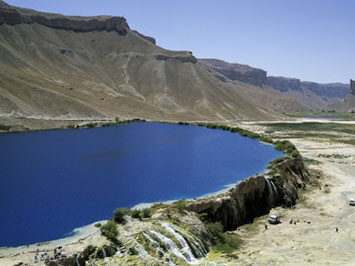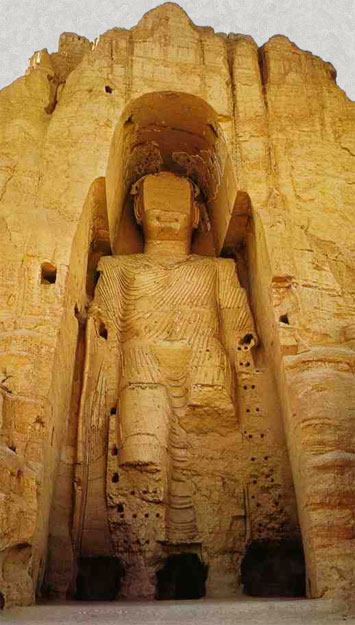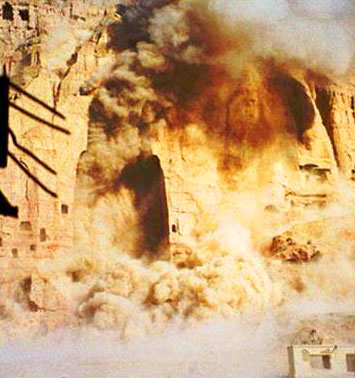
Band-e-Amir — lakes in the desert in the mountains
Afghanistan provided some of the favourite stops on the Hippy Trail, until the 1979 Russian invasion of the impoverished country. Backpacking Westerners by the busload brought welcome tourist dollars and ogled the remnants of the empire of King Ashoka, who spread Buddhism from Asia to the banks of the Red Sea.
The following account of those times is extracted from an early draft of The Novice.
“You are leaving,” said the hotel owner. “But you have paid in advance.” He seemed disappointed.
“I’ll be back,” I said, “I can use my leftover days then?”
He shook his head from side to side in the Asian gesture of assent. “No problem.” He looked thoughtful for a moment and asked, “Where you are going?”
“To Bamiyan,” I said.
“Ah! Then go also to Band-e-Amir. High up in the mountains. Beautiful lakes in the desert.” He smiled.
“Lakes in the desert in the mountains?” It sounded like a riddle, but he gave no further clue, “Go and see. You will be happy.”
The lorry was typically Afghan, painted colourfully and rimmed with lattice and wrought iron, hardly suited to the track that soon became little more than a watercourse – a spring runoff from the mountain snows. There was no discernable road surface. One corner of the vehicle rose precipitously while another sunk into a pothole, then the whole leaned sideways and lurched into a depression. The driver rarely shifted up from first gear, and never beyond second.
The almost complete lack of vegetation was made up for by the spectacular play of light and shade over desert vistas. They rose and fell in sandy golds and distant blues that seemed almost orchestrated. As we reached greater elevations, the turn of a corner or rise of a hill revealed landscapes of unimaginable depth. The country seemed to stretch forever into an empty vastness.
I spent a few days in Bamiyan recuperating from my bout of hepatitis and exploring the massive buddhas carved into the cliff face. Then I climbed into another lorry for the ongoing trip with some new travelling companions. We had the rare luxury of being alone in the back and took pleasure in sitting or standing as we pleased, but soon found that sitting wasn’t much of an option. The road – wider, less pitted and rock-strewn than the narrow road from Kabul – enabled us to maintain a good twenty-five miles an hour, at which speed every rock or pit produced a spine-compressing thud that shot from coccyx to skull and left the brain vibrating like a bell. We learned to hang on to the overhead frame for the tarpaulin cover, and bent our knees to absorb the shocks. The Afghan desert climbed higher and higher, and the space around us grew vast. More than once we raised our hands to touch the sky.
Finally the driver stopped just before the brow of a wide, softly rounded mountaintop, and pointed straight ahead, encouraging us to jump down. I got out first and immediately saw a single yellow flower among the rocks. A few cacti were all that grew there, and this had needles in place of leaves. But the flower was wide open like a saucer and seemed too delicate for this rugged terrain. In an Alpine meadow it would be insignificant, but here it stood out like a beacon.
I wandered off, a little disappointed by the endless barren slopes in all directions. Behind me, the driver was shouting and waving me on. I strolled over to the brow of the hill and found myself on the edge of a cliff, suddenly gazing into the most startlingly deep blue water I’d ever seen. Hundreds of feet below, in a huge hole sunk deep into its surrounding vertical rock walls, it lay as still as the mountains it reflected, its depth and colour utterly fantastic. I looked over my shoulder at the driver who nodded sagely with his hands on his hips and a broad grin on his face. I turned back to the lake and stared into it, mesmerized. It appeared to be bottomless, but the stillness was uncanny. I struggled to believe what I was seeing. As I went forward I saw the whole vista of a series of lakes flowing over a series of natural dams, running from higher to lower.

Band-e Zulfiqar (sword of Ali);
one of the six lakes of Band-e-Amir —the dots in the right foreground are people near a pickup truck
One by one, the others came to the rise of the hill and stopped dead in their tracks. A shout from another side of the hill broke my reverie, and I went over to another lake that stood above the valley floor like a dish of water discarded by an untidy giant.

One of the two giant 6th Century Buddhas of Bamiyan,
55 and 37 metres (180 and 121 feet) high respectively

A Testament of True Believers
— Dynamiting the Bamiyan Buddha —
“Muslims should be proud of smashing idols. It has
given praise to Allah that we have destroyed them.”
[Mullah Mohammed Omar,
who
ordered the destruction;
March 6, 2001]
Water flowed over one edge, producing thick limestone overgrowths and suggesting that minerals deposited by the water itself had formed the containing walls. They rose improbably upward to hold back the immense weight of water.
We wandered the hilltop until the honking of our driver called us back. Down in the valley, two large white tents waited to house us for the night. We were greeted deferentially. Inside, the rocky ground was covered in layers of sturdy Afghan rugs, where we sat and drank tea. But only ten minutes later, we jumped up to go out again, and spent the remaining daylight hours exploring.
Alongside one of the lakes was a long flat strip of stone, a sort of natural pavement, and at one end of it we found a small hut, outside which a ragged old man grilled fish on a stick and offered them for sale. They were delicious.
The water was icy cold and the air was crisp and dry. The area was otherwise deserted, and seemed like a remnant of Eden. We walked and gawked until we were exhausted, slept like logs and gawked again the next morning.
By late afternoon, the same driver had returned with another small load of tourists to take our places, and soon we stood on the back of the lorry looking backwards. I knew that Band-e-Amir would remain a crystal clear memory for life.
By contrast, Bamiyan bazaar now seemed crowded and contrived. I spent another ten days exploring the caves around the giant buddhas and the surrounding area, telling everyone I met to go and see the lakes. Those who had visited them already could hardly talk of anything else. I felt numbed by the overwhelming beauty I'd seen, but saddened too, for there was nothing I could do with it. I couldn't take it with me. I was reluctant to leave Bamiyan, for I'd be leaving my proximity to Band-e-Amir, which I'd probably never see again.
One morning, however, I crawled into the back of another pick-up truck for the bone-jarring trip down to Kabul, which was at least a little shorter than it had been in the other direction. The city was grimy and noisy. Back at the Golden Temple hotel in Kabul for a couple of days, I realised that my time in Afghanistan had come to an end, and looked eastwards to the Khyber Pass and Pakistan.
